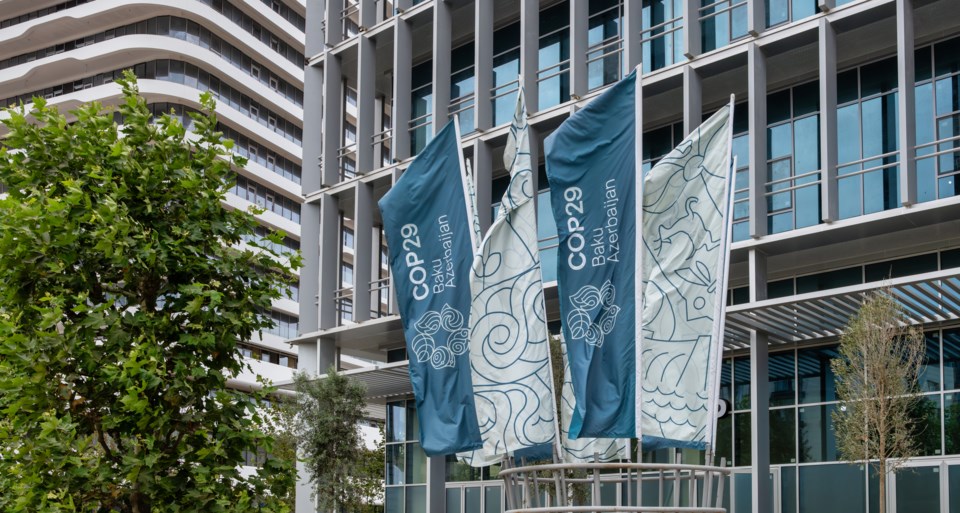In a cruel case of injustice heaped upon injustice, .
For centuries, richer nations accrued vast wealth by exploiting the planet’s resources at the expense of less developed, poorer countries. Most of these countries are in and what we now call the — Africa, Asia, Oceania, Latin America and the Caribbean.
Today, the wealthiest . At the same time, the wealthiest country on Earth, the United States, .
The election of . At the same time, a senior member of Azerbaijan’s COP29 team has been .
Extreme drought, flooding, unprecedented storms, sea-level rise and wildfire are bringing renewed attention to the longstanding calls for just transition and climate justice.
While the United Nations climate conferences, known as Conferences of the Parties (COP) have made strides in international climate policy, their efforts to address climate justice .
I am a legal historian and scholar of human rights currently involved in an ongoing UN-led research project that seeks to identify the . As part of that work, I am currently in Azerbaijan to discuss my preliminary findings with a range of stakeholders at .
This year’s COP29 represents a critical moment to centre climate justice at the heart of the global effort against climate change.
Climate (in)justice
The concept of climate justice is rooted in the knowledge that the impacts of climate change are . It emphasizes the ethical responsibility of those who have reaped the most benefits from carbon-intensive development to reduce their emissions and assist those who are most affected by climate change.
We can’t have conversations about our climate and environmental goals without including the parties who have suffered the most and stand to suffer more.
Many developing countries are just starting their own industrial revolutions. A lack of practical alternatives is forcing many developing nations to . They need help to catch up, to avoid worsening the problems that wealthier neighbours have already inflicted on the planet.
Help could come in the form of climate finance and technology transfer. At COP15 in 2009, developed countries pledged US$100 billion annually by 2020 to support climate action in developing nations. The commitment was achieved .
Building a truly healthy planet requires a . However, we must also recognize that while all states are responsible for addressing global environmental destruction, not all are equally responsible.
To achieve consensus on climate action, we must address underlying inequities. We must recognize that we can no longer deny poorer countries the right to have equal voices in setting the forward-looking plans that need to be made in the coming years. Put simply, we must reassert the value of fairness.
Going beyond current initiatives
Climate justice requires a commitment to the equitable distribution of resources and benefits, ensuring that the costs and benefits of climate action are shared fairly. In other words, climate justice must be integrated into all aspects of the global political economy, including development financing, technology transfer, and international trade policies.
Existing initiatives such as the , and the under the Climate Change Framework Convention do provide important frameworks for climate justice.
However, . We need to do much more, and that will take more buy-in and greater investment from the world’s wealthier countries.
Global investments in climate justice must extend beyond existing frameworks. Our efforts should encompass reforms to international trade and global governance to ensure greater equity and fairer representation for all peoples.
Enlightened self-interest
It doesn’t take an expert in political science to predict that when asked to pay most countries will become mired in politics and inaction. In that case, the most practical, substantial motivation to act may lie in enlightened self-interest.
As experts had predicted, , driving more displaced people from the Global South to seek safety and prosperity in Europe and North America, straining resources, fuelling xenophobia, and driving politicians to close borders.
By helping countries in the Global South to address their climate-driven crises, developed countries would help people remain in their homes instead of having to seek refuge in the Global North. That cynical calculus may finally be what drives the change necessary to address climate issues around the world.
At this point, the source of the motivation matters much less than the motivation itself. Only quick, significant, and inclusive action can help save what is not already doomed.
COP29 is set to be all about finance as discussions will largely focus on increasing funding to help lower-income countries reduce greenhouse gas emissions.
As UN Secretary-General António Guterres noted at the opening of COP29, .
These deliberations offer a renewed opportunity to prioritize climate justice by reinforcing financing for mitigation and adaptation strategies rooted in equity and fairness.
Bonny Ibhawoh receives funding from the Social Sciences and Humanities Research Council of Canada. He is a United Nations Independent Expert on the UN Expert Mechanism on the Right to Development.




